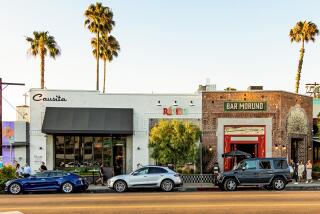Chinatown businesses begin to feel sting of coronavirus scare
The traditional archway that welcomes all to Chinatown’s Central Plaza on North Broadway in downtown Los Angeles greeted few visitors last week.
The usually vibrant hub for Chinese culture, food and souvenirs more closely resembled a ghost town. Street parking and restaurant seating were readily available in the historic neighborhood known for its colorful pagoda-style buildings, art galleries and plazas strewn with bright red lanterns and neon-lined rooftops.
“It’s kind of spooky around here,” said Robert Hernandez, 39, of Echo Park. “I found parking kind of easy on the street, which is always a problem. I guess I didn’t expect this place to be so empty.”
Though there has yet to be a single documented case of the new coronavirus connected to Chinatown, the popular gathering spot has seen growing fear drive away customers in recent weeks, jeopardizing long-established businesses.
As the lunch hour approached on Friday afternoon, the smell of herbs and spice wafted from the narrow entryway of Pho Hoa noodle restaurant. Cook Luu Ha, 70, said business has been slow. Too slow.
“I’m still waiting for it to pick up,” said Ha, who also buses tables, whatever the workday demands. “When it picks up, I’ll end my break and go back in,” he said, as he lounged in front of the restaurant and surveyed the scene across North Spring Street.
Only a few customers occupied chairs at the neighborhood hair salon, while no one entered or exited from the Metro at Chinatown Senior Lofts. Typically, a line of cars takes up most of the metered parking along the thoroughfare, but on this day, there were plenty of open spaces.
“I expected to hear bargaining or to see a lot more tourists than this,” said Wendi Li, visiting from Washington, as she guided her retired aunt and uncle in and out of Wonder Bakery, where they stopped for coconut bread and steaming cups of green tea.
“It’s so quiet, like a cemetery,” said the 41-year-old, who is considering moving from the Pacific Northwest to California but so far is worried about the higher costs of housing.
Her relatives have been suffering from allergies lately, so she flew down to spend time with them. She was surprised to see the decline in business at familiar haunts — from the family dentist along North Broadway to the snack spots at Central Plaza.
The trio walked toward the popular Bruce Lee statue along Sun Mun Way, created by a Chinese artist and installed in 2013 as a tribute to the late martial artist. The 7-foot-tall bronze statue of Lee in fighting stance is usually a magnet for picture-snapping tourists, but not on this day.
“Even here, no one,” said Li, an accounting clerk. “When I was little, it was always crowded around this plaza with pretty lanterns hanging and people capturing the scene for their photo albums.
“What’s happening around the world is that people are freaking out about the virus when all they have to do is be more careful,” he said. “They should not react this way and avoid special places.”
Ha, a father of seven children, agreed. “One rumor gives birth to dozens” of rumors and false scenarios multiply, he said. “I totally don’t believe there’s a health crisis. We just need to keep the situation in perspective.”
Sue Li, Wendi Li’s aunt, said it’s “disappointing” that the public would “willingly believe that everyone is at risk” if they step into an area populated by hard-working immigrants from parts of Asia. People need to consult their doctors and do what’s best to protect themselves from infection, she said.
“Chinatown, Koreatown, wherever, all these communities have a special spirit,” said Sue Li, 66, who points to the low prices advertised at some of the best dim sum eateries in the nation. “We should be grateful they exist because they are what form the beauty and delicious menu of all of California. We should support each other in times of trouble.”
It’s common to wait 45 minutes or longer to grab a table at Yang Chow, a Mandarin and Szechuan eatery, whose large number of entrees is outmatched perhaps only by the quantity of signed celebrity photos on display in the restaurant.
There was no line on Friday afternoon, though manager Benny Yun’s restaurant was about 70% full.
“We’ve had a drop in business the last couple of months like a lot of other places in Chinatown,” Yun, 38, said. “It could be worse. I’ve heard of about five restaurants in the San Gabriel Valley that have closed in the last month.”
Yun estimates Yang Chow, which has been in business for 43 years, has seen sales fall 30% from the same time last year.
“There are people worried about the coronavirus,” Yun said. “All we can do is continue to serve quality food.”
A block away on North Hill Street, another 43-year-old business was also showing signs of strain.
Foo Chow restaurant enjoyed monster crowds and attention after Chinese superstar Jackie Chan and Chris Tucker burst through its doors in “Rush Hour,” an action, comedy and buddy film released in 1998.
On Friday, nine people dined in the temperature-controlled two-story restaurant, which has started to feel the coronavirus’ squeeze.
“We were OK up until a month ago,” said cashier Eason Liu, 28. “Now it’s kind of slowed down. We just don’t see the big crowds, even on the weekends. People are staying home.”
More to Read
Sign up for Essential California
The most important California stories and recommendations in your inbox every morning.
You may occasionally receive promotional content from the Los Angeles Times.












